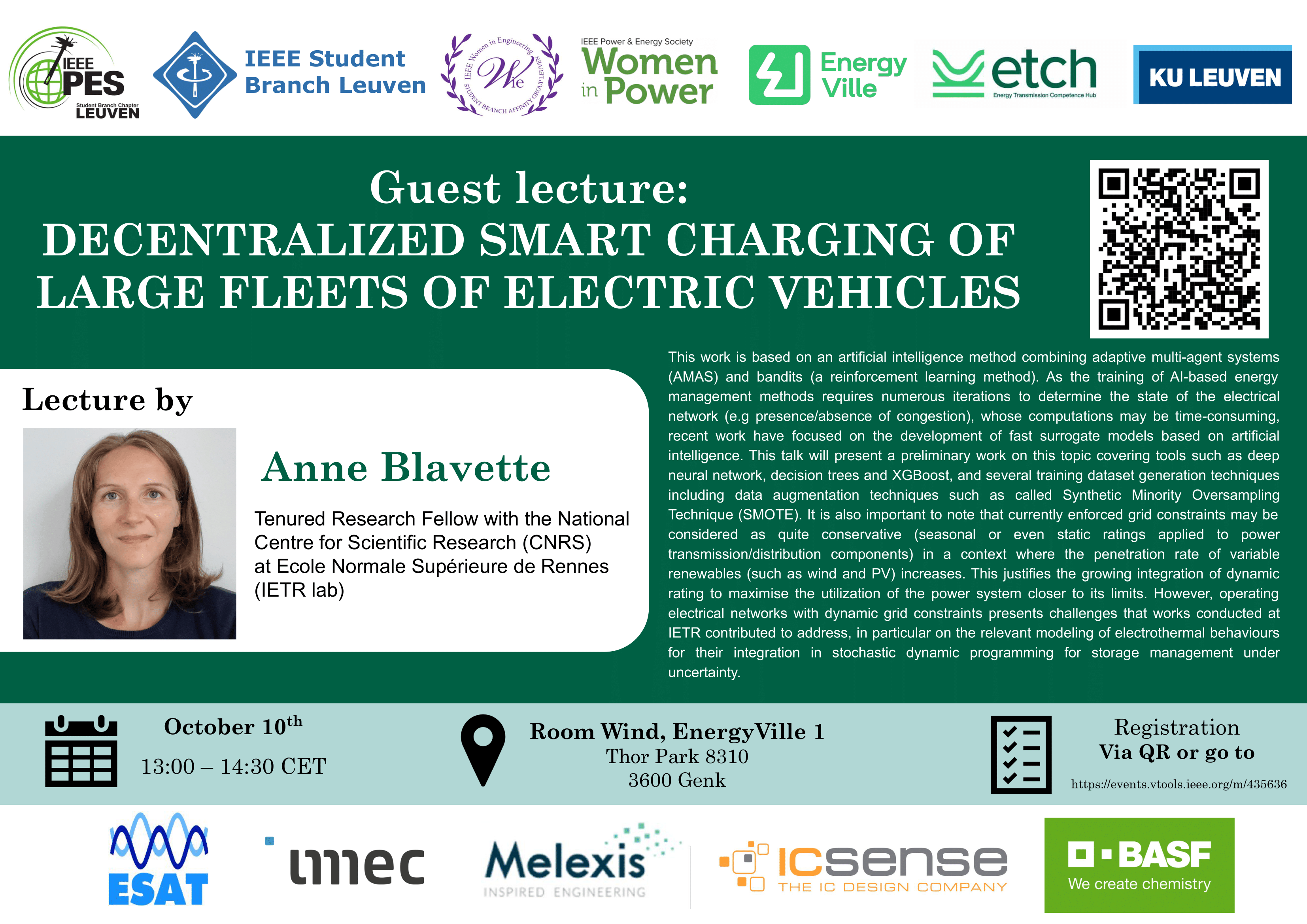Lecture by Anne Blavette - Decentralized smart charging of large fleets of electric vehicles
This talk will describe some recent research works at the IETR lab on the decentralized smart charging of large fleets of electric vehicles. This work is based on an artificial intelligence method combining adaptive multi-agent systems (AMAS) and bandits (a reinforcement learning method) [Zafar, 2023]. As the training of AI-based energy management methods requires numerous iterations to determine the state of the electrical network (e.g presence/absence of congestion), whose computations may be time-consuming, recent work have focused on the development of fast surrogate models based on artificial intelligence. This talk will present a preliminary work on this topic covering tools such as deep neural network, decision trees and XGBoost, and several training dataset generation techniques including data augmentation techniques such as called Synthetic Minority Oversampling Technique (SMOTE) [Cuenca, 2024]. It is also important to note that currently enforced grid constraints may be considered as quite conservative (seasonal or even static ratings applied to power transmission/distribution components) in a context where the penetration rate of variable renewables (such as wind and PV) increases. This justifies the growing integration of dynamic rating to maximise the utilization of the power system closer to its limits. However, operating electrical networks with dynamic grid constraints presents challenges that works conducted at IETR contributed to address, in particular on the relevant modeling of electrothermal behaviours for their integration in stochastic dynamic programming for storage management under uncertainty [Faye, 2023].
[Zafar, 2023] S. Zafar, “Optimized management of an active distribution network using AMAS combined with the RL bandit method”, PhD thesis, ENS Rennes, France, 2023.
[Cuenca, 2024] J. Cuenca, E. Aldea, E. Le Guern-Dall’o, R. Féraud, G. Camileri, A. Blavette, “Training Data Generation Strategies for Data-driven Security Assessment of Low Voltage Smart Grids », to be presented at the IEEE ISGT Europe conference, Dubrovnik, Croatia, October 2024.
[Faye, 2023] A. Faye-Bédrin, A. Blavette, P. Haessig, S. Bourguet, I. Daminov, “Stochastic Dynamic Programming for Energy Management of an Overplanted Offshore Wind Farm with Dynamic Thermal Rating and Storage”, in Proc. IEEE PowerTech, Belgrade, Serbia, 2023.
Date and Time
Location
Hosts
Registration
-
 Add Event to Calendar
Add Event to Calendar
Loading virtual attendance info...
- Thor Park 8310
- Genk, Limburg
- Belgium 3600
- Building: EnergyVille 1
- Room Number: Room Wind
- Click here for Map
Speakers
Anne Blavette
Lecture by Anne Blavette - Decentralized smart charging of large fleets of electric vehicles
This talk will describe some recent research works at the IETR lab on the decentralized smart charging of large fleets of electric vehicles. This work is based on an artificial intelligence method combining adaptive multi-agent systems (AMAS) and bandits (a reinforcement learning method) [Zafar, 2023]. As the training of AI-based energy management methods requires numerous iterations to determine the state of the electrical network (e.g presence/absence of congestion), whose computations may be time-consuming, recent work have focused on the development of fast surrogate models based on artificial intelligence. This talk will present a preliminary work on this topic covering tools such as deep neural network, decision trees and XGBoost, and several training dataset generation techniques including data augmentation techniques such as called Synthetic Minority Oversampling Technique (SMOTE) [Cuenca, 2024]. It is also important to note that currently enforced grid constraints may be considered as quite conservative (seasonal or even static ratings applied to power transmission/distribution components) in a context where the penetration rate of variable renewables (such as wind and PV) increases. This justifies the growing integration of dynamic rating to maximise the utilization of the power system closer to its limits. However, operating electrical networks with dynamic grid constraints presents challenges that works conducted at IETR contributed to address, in particular on the relevant modeling of electrothermal behaviours for their integration in stochastic dynamic programming for storage management under uncertainty [Faye, 2023].
[Zafar, 2023] S. Zafar, “Optimized management of an active distribution network using AMAS combined with the RL bandit method”, PhD thesis, ENS Rennes, France, 2023.
[Cuenca, 2024] J. Cuenca, E. Aldea, E. Le Guern-Dall’o, R. Féraud, G. Camileri, A. Blavette, “Training Data Generation Strategies for Data-driven Security Assessment of Low Voltage Smart Grids », to be presented at the IEEE ISGT Europe conference, Dubrovnik, Croatia, October 2024.
[Faye, 2023] A. Faye-Bédrin, A. Blavette, P. Haessig, S. Bourguet, I. Daminov, “Stochastic Dynamic Programming for Energy Management of an Overplanted Offshore Wind Farm with Dynamic Thermal Rating and Storage”, in Proc. IEEE PowerTech, Belgrade, Serbia, 2023.
Biography:
Anne Blavette received her PhD in electrical engineering from University College Cork, Ireland in 2013 in the field of the grid integration of marine renewables. After one post-doc at the University of Nantes, France in the same topic in 2014, she expanded her research field to the optimization of the design and energy management in power systems during a Marie Sklodowska-Curie Fellowship (2015). Since 2015, she is a Tenured Research Fellow with the National Centre for Scientific Research (CNRS) at Ecole Normale Supérieure de Rennes (IETR lab). Her research interests cover the modeling of electrical networks, and the optimization under uncertainty of power systems design and energy management from a wide range of tools going from mathematical optimization (MILP, stochastic dynamic programming) to AI tools (multi-agent systems, supervised learning, reinforcement learning). Her work covers several types of applications: smart charging of large-scale fleets of electric vehicles considering real-time and grid constraints, dynamic rating for offshore networks, datacenters powered from renewables, AI-based safety assessment for power systems, impact of cyber-attacks on the power system, etc.



